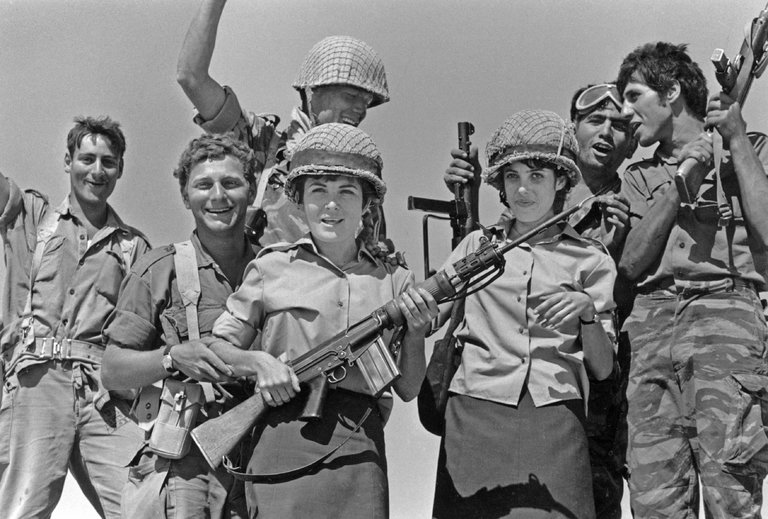This week marks the 50th anniversary of what’s called in Israel and the United States the Six-Day War, and an-Naksah (“The Setback”) in Palestine—a conflict that lasted from June 4 to June 10, 1967, and marked the beginning of a decades-long occupation of Gaza and the West Bank by the Israeli military. In their respective opinion pieces analyzing the conflict and its subsequent effect on the Israeli/Palestinian conflict, major US media have favored Israeli and pro-Israel American voices at the expense of Palestinians by a wide margin.
A survey of opinion pieces in major US newspapers and magazines over the past week found that an overwhelming majority of voices featured in the media—23 out of 26—were Israeli or American, while only three were Palestinian or Palestinian-American.
Here is a list of opinion pieces by Israelis and Israeli-Americans, which looked at the war and subsequent occupation from a variety of Israel-centric perspectives:
- Israel’s 1967 Victory Is Something to Celebrate (New York Times, 6/2/17)
- How Occupation Has Damaged Israel’s Democracy (Washington Post, 6/4/17)
- Tel Aviv Diary: Where Did the Six-Day War Leave Us (Newsweek, 6/4/17)
- Israelis Have Mixed Feelings About the 50th Anniversary of the Six-Day War (NPR, 6/4/17)
- 50 Years After the Six-Day War, Israel Should Pull Out of Most of the West Bank (LA Times, 6/5/17)
- How the Six-Day War Safeguarded Israel as the Middle East’s Democratic Anchor (Newsweek, 6/5/17)
- Still Stuck Between May and June of 1967 (New York Times, 6/5/17)
- When Israel’s Religious Zionists Got Their Big Break (The Atlantic, 6/5/17)
- How the Six-Day War Changed Israel’s Mind (New Yorker, 6/5/17)
- Israeli Novelist Highlights Lasting Consequences of Six-Day War (NPR, 6/6/17)
- Israel Continues to Seek Mideast Peace 50 Years After Six-Day War (Chicago Sun-Times, 6/7/17)
- How the KGB Started the War That Changed the Middle East (New York Times, 6/7/17)
An equal number of opinion pieces were written by Americans (other than Israeli-Americans or Palestinian-Americans):
- The Myths About 1967 That Just Won’t Die (The Atlantic, 6/2/17)
- Six Days and 50 Years of War (New York Times, 6/2/17)
- The Past 50 Years of Israeli Occupation. And the Next (New York Times, 6/2/17)
- In Spring of 1967, Israel Proved It Was Here to Stay (Miami Herald, 6/2/17)
- America’s Half Century of Failure in the Middle East (CNN, 6/3/17)
- 50 Years and Six Days: How the Mideast Has and Has Not Changed (Daily News, 6/4/17)
- How “Israelotry” Became an American Religion (The Atlantic, 6/5/17)
- Evangelical Zeal for 1967 Wasn’t Really About Jews (The Atlantic, 6/5/17)
- Should Mormons Take Sides? With Whom? (The Atlantic, 6/5/17)
- The Crisis of Arab Nationalism and the Rise of Islamism (The Atlantic, 6/5/17)
- The Six-Day War Was a Step Backward for Zionism (The Atlantic, 6/6/17)
- Israel’s Victory in Six-Day War Astonished the World (Boston Globe, 6/7/17)
The US-authored opinion pieces were generally sympathetic to Israel, or examined the war in terms of its impact on Israel. Two notable exceptions were Nathan Thrall (New York Times, 6/2/17), who’s seen as a critic of both Israeli and Palestinian leadership, and Lebanese-American writer Hussein Ibish (The Atlantic, 6/5/17).
Compared to these, there were just three Palestinian voices in Six-Day War opinion coverage: “How the 1967 War Came Home to Me,” by Hasan Ashwari in the New York Times (6/5/17), an NPR interview (6/7/17) with Palestinian lawyer and writer Raja Shehadeh, and one short essay focusing on how the war changed religion in Palestine (but with no commentary on the war itself) by Maysoon Zayid, Palestinian-American comedian, writer and disability advocate, in The Atlantic (6/5/17). The essay appeared alongside five non-Palestinian perspectives.
This is a ratio consistent with the New York Times series “The Six-Day War at 50”—which features one opinion piece a day on the Six-Day War—and has thus far featured three Israelis, one American and one Palestinian. To the extent that Palestinians get to write about their own occupation, it is typically a token, box-checking gesture, as if trying to barely avoid being uniformly Israeli and American.
The most recent installment (6/7/17) of the New York Times series dubiously claims “destructive, diabolical” Russia “started” the Six-Day War with “disinformation and the use of that fake fact”—thus, by extension, absolving Israel of responsibility for its 50-year military occupation, while playing into current fears about Russian puppetmasters moving world events at will.
One-sided punditry isn’t limited to Israel; as FAIR (4/28/17, 5/17/17) has noted, other US allies, such as Saudi Arabia, routinely receive fawning coverage from US media personalities and editorial boards.
It’s worth highlighting some pieces that broadened corporate media’s coverage of the 1967 conflict and its lasting effects. The Washington Post ran a series of non-opinion reports focusing on the effects of Israel’s military occupation two weeks ago that were frequently sympathetic to Palestinians, highlighting their daily struggles. Two weeks ago, the New York Times ran an op-ed (5/23/17) by Palestinian-Canadian lawyer and former PLO spokesperson Diana Buttu, critiquing Israel and the Palestinian Authority.
Counting the ethnicities or nationalities of commentators isn’t a perfect instrument in analyzing bias; after all, Fox News can always find African-Americans to tell you Black Lives Matter is a hate group. But it is one proxy for determining which voices are being amplified and which aren’t. As FAIR has noted before (4/6/17), pro-BDS and pro-Palestinian voices are overwhelmingly outnumbered in the New York Times by anti-BDS, pro-Israel commentators—a trend even more apparent in media at large, and one likely to continue indefinitely.

